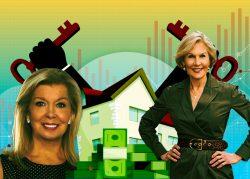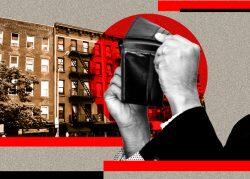When approached by landlords attempting to navigate the hot rental market, Compass agent Carlos Aldana recommends they set rents 15 to 20 percent higher than they were before the pandemic.
“Landlords have the ball in their court,” Aldana said. “They’re offering aggressive renewals and if that renter says no, they know that they’ll be able to achieve it elsewhere.”
As Covid-era rental discounts expire, tenants have been left scrambling. Many who cannot afford steep increases have migrated to other parts of the city as new renters arrive to fill those vacancies.
It’s like a game of musical chairs.
“Most of them are moving,” said Robert Chattah, an agent with Compass. “Very few are actually able to take on the full gross rent of where it is today.”
New York City’s median rent is up 19 percent year-over-year to $2,975, according to data from StreetEasy. Manhattan’s median rent has jumped 36 percent to $3,800 while Brooklyn’s is up 17 percent to $2,800, both the highest ever in StreetEasy records.
In “areas like the East Village, we are seeing rent growth that we’ve never seen in the past decade,” said Living New York’s co-founder and principal Devin Someck.
Many brokers said they have seen migration to the outer boroughs as well as to Upper Manhattan.
The rise in demand has shifted power from the renters to the property owners. Rather than giving concessions to just about anyone looking to rent, landlords now have the ability to be picky.
“Now, they’re saying, ‘We want everything,’” said Brian Hourigan, director of professional development at BOND New York. “There are opportunities for landlords now to say, ‘We are standing firm with our requirements.’”
So far, renters have not turned away. Instead, the competition has turned fierce.
In March, bidding wars accounted for one in five new lease signings and the average home spent 61 days on the market, down 9 percent from February and 39 percent year-over-year, according to a report by appraisal firm Miller Samuel for Douglas Elliman.
Read more



More inventory is expected to hit the market in spring and summer, as many renters signed for 16-, 18- and 24-month leases and an influx of new New Yorkers are expected to join the hunt for apartments.
Students, for example, who have been missing from the market, are expected to rent three-bedroom and larger apartments — a sector that has experienced less interest during the pandemic.
“That three-bed market is the last to come back and I think we’re now starting to see the pressure,” said Josiah Hyatt, associate broker at Keller Williams NYC and founder of the Skyward Team. “It will probably take the new incoming student push and those new graduates to bring that market fully back.”
Frustration with the rental market has pushed some prospective tenants into the buyers’ market, which has its own bidding wars to offer.
“A lot of the conversations have been, “Well, hey, the rents are so high right now. Why don’t we take advantage of historically low interest rates?’” said Allan Zapadinsky, an agent with Keller Williams NYC. “We’ve seen a number of people that just said, ‘Why pay so much rent when I can pay the same, if not less, to purchase?’”
Still, some brokers say that renters on the verge of moving aren’t considering the full picture when it comes to broker fees and other move-in costs, which can run into five figures.
“They may initially be like, ‘Alright, fine, I’m not accepting that renewal rate, it’s such a jump, and such an increase, I’m just gonna go find something else.’” Someck said. “Then they’ll come back realizing that if they went to the open market, they could be very likely spending more.”
